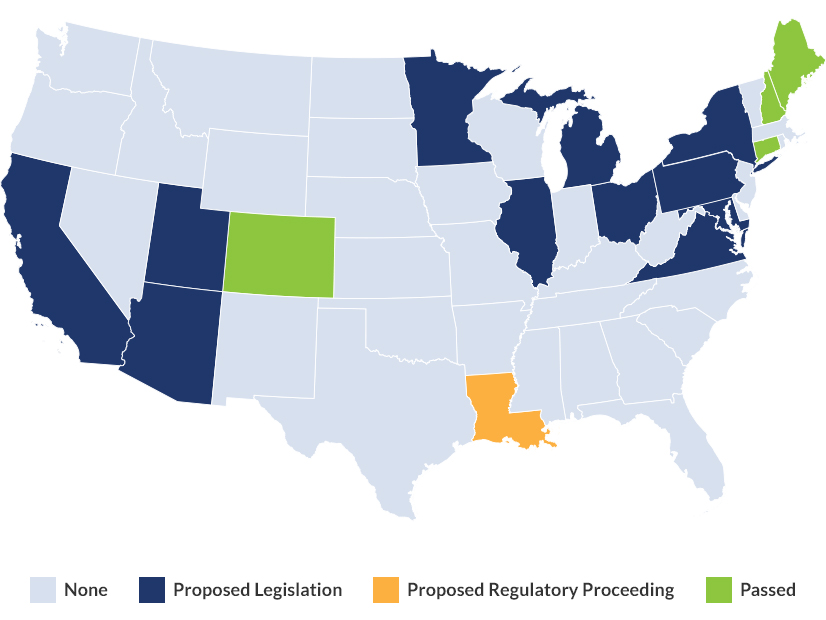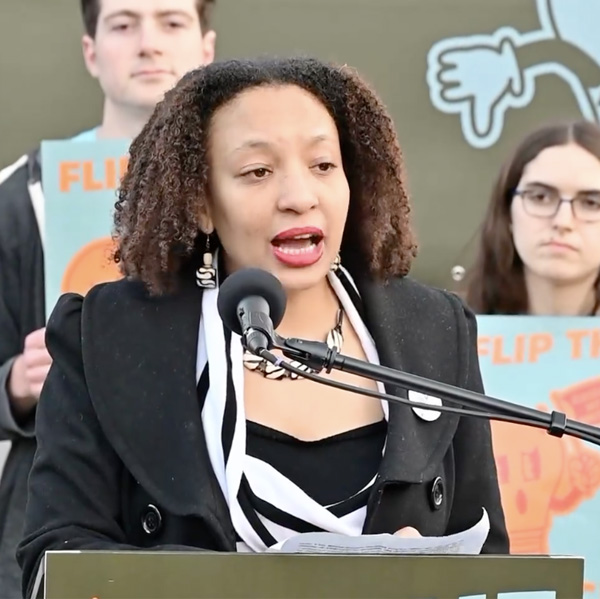
Bribery scandals and concerns over reliability and the pace of decarbonization have caused increasing scrutiny of utilities’ political activities.
Bribery scandals and concerns over reliability and the pace of decarbonization have caused increasing scrutiny of utilities’ political activities.
Almost one-third of U.S. states have approved or are considering actions to bar investor-owned utilities from using customer funds to support political activities.
Michigan last month became the 11th state to consider legislation restricting utilities’ political spending, which already has been approved by four states, according to the Energy and Policy Institute, a watchdog group. In addition, the Louisiana Public Service Commission began a rulemaking last year to investigate utilities’ use of ratepayer money for trade association dues and political influence activities.
The scrutiny of utilities’ political activities follows a string of recent utility scandals, most notably the bribery indictments in Ohio and Illinois. (See Ex-PUCO Chair, Ex-FirstEnergy Execs Indicted in Ohio and Jury Finds Former ComEd CEO, 3 Others Guilty in Bribery Trial.)
Floodlight, a nonprofit newsroom, reported recently that utility fraud and corruption in those states and Florida, Mississippi and South Carolina have cost ratepayers at least $6.6 billion. “Ratepayers have bankrolled nuclear plants that never got built, transmission systems that were over-engineered to beef up profits and aging coal facilities that couldn’t compete with cheaper ones powered by methane, which the industry calls natural gas,” it said.
Pay for Play?
Last week, a group of activists calling themselves the “Flip the Switch” coalition gathered outside the Washington, D.C., hotel where hundreds of state regulators, utility officials and other stakeholders gathered for the National Association of Regulatory Utility Commissioners’ (NARUC) Winter Policy Summit. The group protested what it called the “pay-for-play relationship between utility regulators and the fossil fuel industry” and called on NARUC to stop accepting sponsorship money from groups NARUC members regulate.
The Winter Policy Summit’s sponsors included the American Gas Association, American Petroleum Institute and Edison Electric Institute, the organization representing investor-owned utilities. Groups supporting renewables, such as the American Clean Power Association, Advanced Energy United and the Solar Energy Industries Association, also were sponsors. (Disclosure: RTO Insider LLC also was a sponsor.)
Regina L. Davis, NARUC’s assistant executive director, rejected the protestors’ claim of a “pay-to-play” relationship.
“Because we work hard to convene meetings that foster collaborative discussions and dialogues on a range of issues, we will attract trade groups, whether or not they are sponsors,” she said. “As a fuel-agnostic association, our sponsors represent a range of energy sectors. At this meeting, more than 90% of our sponsors were not affiliated with the fossil fuel industry.”
“We would encourage anyone seriously interested in how our meetings are run to review the Winter meeting agenda instead of making broad generalizations that are not based in fact,” she added. “Our members and stakeholders hold diverse views related to the clean energy transition and are focused on how best to ensure safe, reliable, and affordable energy.”
She noted that attendees included consumer advocates and that NARUC provides free admission to the press, “who function as the eyes and ears of the public.”
In a statement last month, EEI defended its lobbying and its environmental record, saying U.S. power sector carbon emissions are as low as they were 40 years ago, while electricity use has climbed 73%.
“EEI’s member companies are among the most regulated companies in the country, and EEI engages on their behalf with federal and state legislators, regulators and other policymakers through lobbying, advocacy and regulatory proceedings, with the goal of providing customers with the affordable, reliable and resilient clean energy they need and expect,” it said.
In 2021, FERC opened a Notice of Inquiry over the recovery of trade association dues in utility rates, with commissioners questioning whether customers should pay for groups that seek policies that may be contrary to consumers’ interests (RM22-5). However, there has been no substantive action in the docket since comments were filed almost two years ago. (See FERC Questions Ratepayer Funding of Trade Association Dues.)
Michigan Legislation
At a press conference Feb. 22, several Michigan Democrats called for legislation to bar the state’s electric utilities from making political contributions to candidates, political parties and accounts tied to state politicians or social welfare groups.
HB 5521 prohibits an electric or natural gas utility regulated by the Michigan Public Service Commission from making donations or contributions to 501(c)(4) (political nonprofits) or 527 (political action committees) organizations. HB 5520 prohibits 501(c)(4) or 527 organizations affiliated with state regulated utilities from making donations or contributions to other 501(c)(4) or 527 groups.
The proposal is backed by a number of environmental and community activist groups but is opposed by DTE Energy and CMS Energy, Michigan’s largest utilities.
The proposal is aimed at forcing utilities to focus on improving their overall service “instead of increasing their profits,” said the sponsor, Rep. Dylan Wegela (D), referring to blackouts that have followed major storms.
Wegela, from the Detroit suburb of Garden City, was joined at the press conference by state Sen. Jeff Irwin (D) of Ann Arbor — a city that has an ongoing standoff with DTE over service and rates — as well as state Rep. Emily Dievendorf (D) of Lansing. Lansing and some of its suburbs are served by the city-owned Board of Water and Light and have had fewer blackout problems than either DTE or CMS. In December 2013, however, BWL customers suffered through a blackout that affected customers for as many as 10 days.
Katie Carey, a spokesperson for CMS, blasted the bills.
“We’re a Michigan company, and we’re all in on Michigan’s prosperity. We strive to conduct our business in a transparent way, including our participation in the legislative and political process. Contributions to elected officials can come from one of two places — either shareholder profits, or voluntary contributions made by our employees to the Employees for Better Government (EBG) PAC — and never customer dollars. The EBG PAC is nonprofit, nonpartisan and governed by an employee-run steering committee that is independent of the corporation’s officers and board. Participation in the PAC is voluntary and gives employees a voice in the political process, and all PAC contributions are publicly disclosed on the secretary of state’s website.”
DTE issued a statement, saying: “DTE’s political giving is transparent and within all campaign finance limits. Like most other organizations, DTE participated in the electoral process to advocate to propose safe, reliable, affordable and clean energy for the 3 million Michigan residents and businesses it serves every day.”
Both utilities have been tied to big money contributions in previous campaigns. In 2022, Michigan Energy First, a 501(c)(4) organization that got money from DTE, donated $1.1 million to the Michigan Democratic Party. In the same year, Citizens for Energizing Michigan’s Economy, a 501(c)(4) organization connected to CMS, donated $200,000 to the Michigan House Democrats.
Given that politicians from both parties have benefited from contributions from utility employees and community groups backed by the utilities, it’s unlikely either party will take a position in favor of Wegela’s bills. Bridge Michigan reported last year that 102 of 148 sitting Michigan lawmakers have received campaign funds from utility company PACs.
Bills Approved
Last year, Colorado, Connecticut and Maine enacted prohibitions on utilities’ recovery of lobbying, advertising or trade association costs, according to the Energy and Policy Institute, which seeks to “expose attacks on renewable energy and counter misinformation by fossil fuel and utility interests.” New Hampshire enacted similar legislation in 2019.




